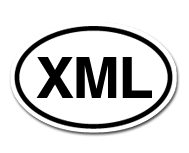After lunch and a little bit of work-related email, I went to Randy Ray‘s Why
XML Hasn’t Cured Our Ills or Saved the World (slides).
The talk centered around five things Ray thinks we do wrong with XML:
- People are too quick to use XML.
You have to aks yourself if it’s really necessary. Is it just for
buzzword-compliance?
- If there is no reason other than the fact that there are XML
parsers, then there probably is a simpler solution
- If only a single consumer, there may be a more economical solution.
- If there is no reason other than the fact that there are XML
- People are too slow to use XML.
- Plan ahead for more than one customer of data?
- If another part of the system is already using XML for a more
“legitimate” task, why not use XML for other things, too?
(i.e. configuration data)
- It isn’t always an extra cost. If the data format (and therefore
the parser) would be sufficiently complex, maybe using an XML parser
would be easier?
- Lack of cooperation or sharing.
- Not often due to malice, perhaps lack of central authority. Who
moderates DTD repositories? Registries on xml.com and xml.org contain
outdataed information, and UDDI is too business-centric.
- Example: difficult to find schema for recipies. Had to wade through
3 pages of Google results to eventually find RecipeML
- Intellectual Property issues. For example, Microsoft hasn’t
openened up the XML formats for Office 2003. Compare to open formats
like DocBook
- Not often due to malice, perhaps lack of central authority. Who
- Misunderstanding the application of XML
- XML is the “NetPBM” of generic data. (NetPBM broke new ground in
image file format transformations by reducing an N * M problem
to N + M).
- People think that XML is only for “document” data.
- XML is the “NetPBM” of generic data. (NetPBM broke new ground in
- People want to make XML hard.
- Tough topics make money. How can businesses sell
books/tools/software/training/services when customers think that XML is
“easy”? Vested interest in making it complicated.
- Tough topics make money. How can businesses sell
In conclusion, Ray mused that no one technology is (yet) a universal solution and XML is no different when it comes data formats. His charge to the audience: just think about XML before using (or not using) it. Self-described experts don’t necessarily have all the answers.
